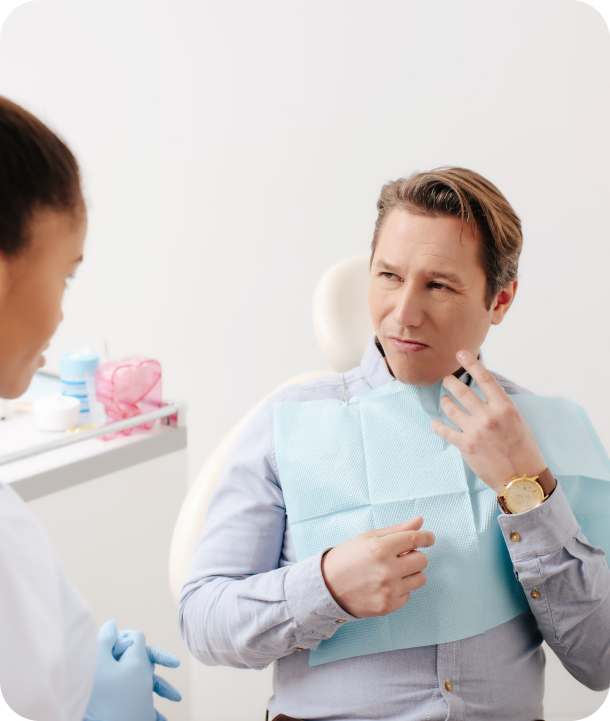Knocked Out Tooth Kelmscott
Relieve pain and preserve your tooth with timely care from the experienced team at Infinite Smiles Dental Clinic Kelmscott.
Our Payment Options

The Tooth Journey: Uncovering the Secrets of a Knocked-Out Tooth
A knocked-out tooth can damage surrounding nerves, blood vessels, and supporting tissues, leading to intense pain and discomfort.
Immediate action and urgent dental care are essential for the best possible outcome. Our experienced team at Infinite Smiles Dental Clinic Kelmscott is ready to provide prompt, compassionate care to manage this dental emergency. Don’t let the pain persist—trust us to handle the situation with expertise and help restore your oral health.
Level Up Your Smile with Kelmscott's Trusted Dental Clinic
Take charge of your dental health. Book an appointment today at Infinite Smiles Dental Kelmscott and experience compassionate and personalised dental care that you can trust.
Book an Appointment
Tooth Emergency: A Complete Guide to Identifying Symptoms of a Knocked-Out Tooth

Understand the vital signs of a knocked-out tooth and learn how to respond quickly for timely and effective treatment.
- Sharp pain and sensitivity
- Bleeding from the socket and surrounding gums
- Changes in tooth alignment or visible gaps in your smile
- Complications like infection, bone loss, and misalignment
Mastering Tooth Recovery: Dental Solutions for a Knocked-Out Tooth
Explore the variety of dental treatments available to repair damaged or broken teeth and restore a healthy, confident smile.

Frequently Asked Questions
About Knocked Out Tooth
Find answers to frequently asked questions about knocked-out teeth, dental emergencies, and how to prevent them.
If your tooth gets knocked out, it’s important to take immediate action. Follow these steps:
- Handle the tooth carefully: Avoid touching the root and handle it by the crown (top) instead.
- Rinse the tooth gently: If the tooth is dirty, rinse it briefly with plain water. Do not scrub or remove any tissue fragments.
- Try to reinsert the tooth (if possible): If you feel comfortable and it’s not a baby tooth, try placing the tooth back into its socket. Bite down gently on a clean cloth or piece of gauze to hold it in place.
- Keep the tooth moist: If reinserting the tooth is not possible, place it in a cup of milk, saline solution, or even your own saliva to keep it moist. Avoid using water, as it can damage the tooth.
- Apply a cold compress: Use an ice pack or a cold cloth wrapped in a thin cloth and apply it to the affected area to reduce swelling and minimise oral pain.
- Seek urgent care: Call your dentist or visit an emergency dental clinic as soon as possible. Time is critical for saving a knocked-out tooth, so prompt professional treatment is essential.
Experiencing a knocked-out tooth can be a traumatic experience. Stay calm, take the necessary steps, and seek professional help promptly. Your dentist will evaluate the tooth, determine the appropriate treatment, and provide the necessary care to increase the chances of saving the tooth.
Bleeding is common after a tooth is knocked out due to damage to blood vessels in the surrounding tissues. Apply gentle pressure to the area using a clean gauze or cloth to control the bleeding. If bleeding persists or is excessive, seek immediate emergency dental care.
Yes, a knocked-out tooth can cause additional dental problems if not addressed promptly. Adjacent teeth may shift or tilt, affecting your bite and overall dental alignment. It can also lead to bone loss in the socket and potential gum issues. Seeking immediate dental care is crucial to preventing further complications.
Complications of a knocked-out tooth include infection, nerve damage, bone loss, and permanent tooth loss if not properly managed. Prompt dental care is essential to assess the condition of the tooth and determine the appropriate treatment, such as root canal therapy or reimplantation.
While accidents can happen unexpectedly, wearing a custom-made mouthguard during activities with a risk of dental injuries, such as contact sports, can help reduce the risk of a tooth getting knocked out. Additionally, maintaining good oral hygiene, attending regular dental check-ups, and addressing any dental issues promptly can contribute to overall oral health and minimise the risk of tooth loss.
To assess if a knocked-out tooth has been damaged or contaminated, follow these steps:
- Rinse with a saline solution: Gently rinse the tooth with a saline solution without scrubbing or touching the tooth root. This helps remove any debris or contaminants.
- Avoid drying or wrapping: Do not dry the tooth or wrap it in tissue or cloth, as this can damage the delicate tooth structure.
- Check for visible damage: Inspect the tooth for any visible tooth fractures, cracks, or other signs of damage. Look for changes in the shape, colour, or texture of the tooth.
- Seek immediate dental care: If you notice any signs of damage or suspect contamination, it is crucial to seek immediate emergency dental care. A dentist can thoroughly evaluate the tooth, assess the risk of complications such as an abscess or painful infection, and provide appropriate treatment.
Remember, even if the tooth appears intact, it is still important to see a dentist as soon as possible. Only a dental professional can determine the extent of any internal damage and provide the necessary treatment to increase the chances of saving the tooth.
Transform Your Smile with Infinite Smiles Dental Kelmscott
Discover personalised dental care designed to enhance your smile at Infinite Smiles Dental Kelmscott. Book an appointment now!